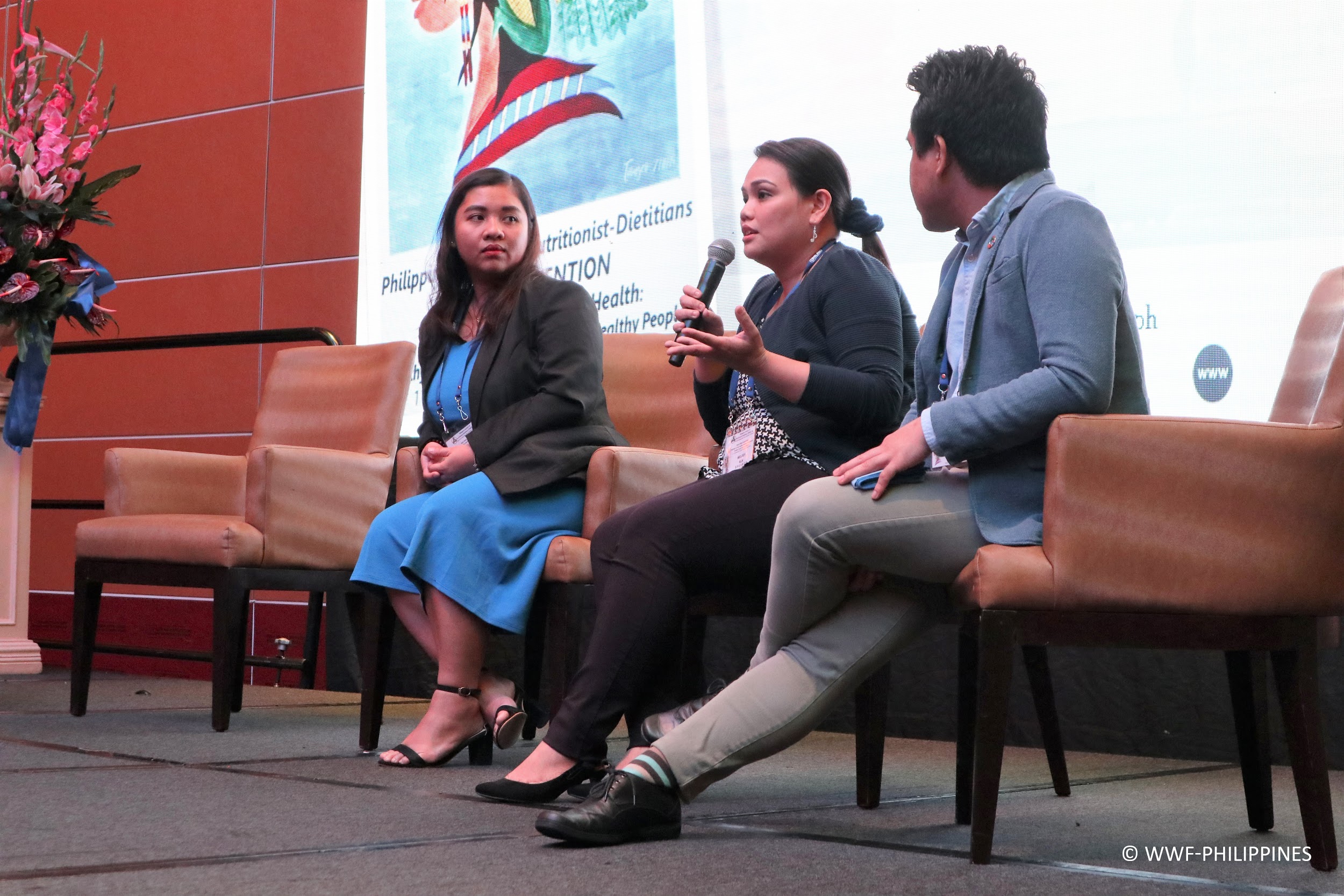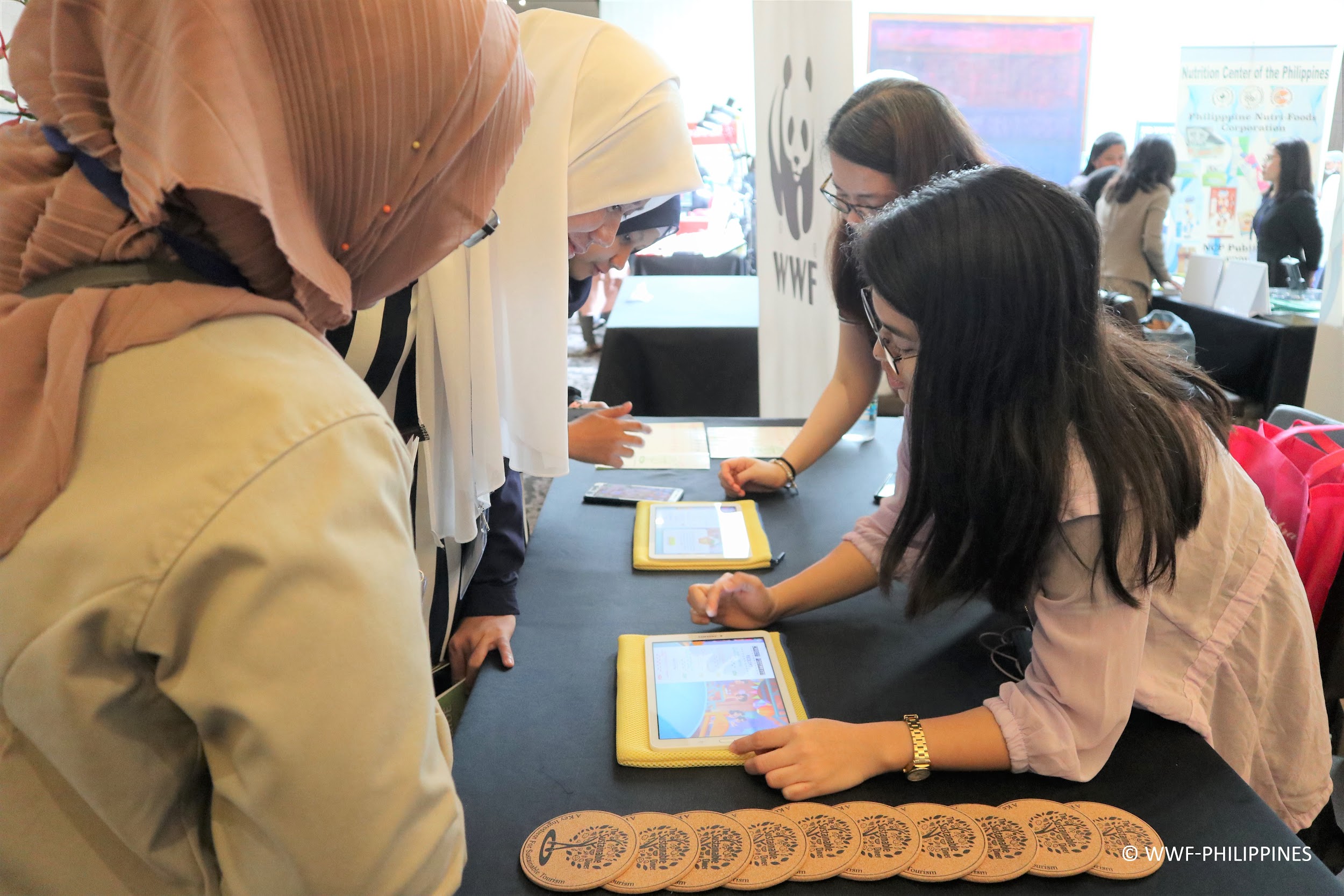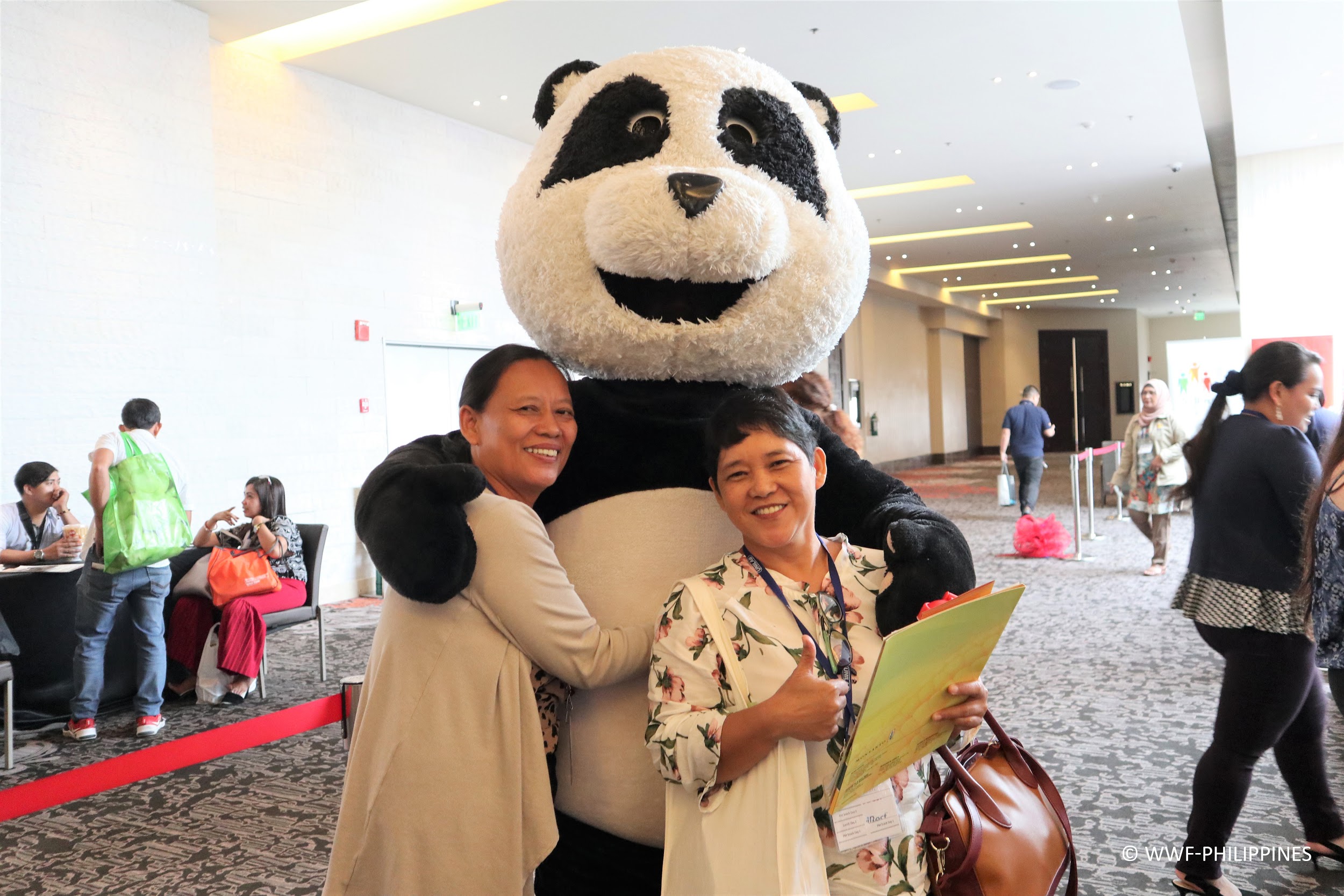The Sustainable Diner at The Philippine Society of Nutritionist-Dietitians (PSND), Inc. 2019 Convention
September 2019

Melody Melo-Rijk, WWF-Philippines’ Project Manager for Sustainable Consumption and Production, presenting The Sustainable Diner project to a crowd of 300+ nutritionist-dietitians attendees at the PSND Annual Convention 2019.
The World Wide Fund for Nature (WWF) Philippines, through The Sustainable Diner: A Key Ingredient for Sustainable Tourism, participated in the 2019 Convention of The Philippine Society of Nutritionist-Dietitians (PSND), Inc. held from September 11 to 12, 2019 at the Manila Marriott Hotel.
Established in 1972, the PSND is a dynamic organization of professionals in the field of nutrition and dietetics and other allied disciplines whose vision is to become a vital partner of the nation when it comes to food and nutrition security. The organization implements activities and services such as continuing education through conventions, symposia, and trainings; offers technical assistance to various groups; conducts several community outreach activities; nutrition counseling; and continuing education for nutritionist-dietitians and professionals in related fields. The annual convention is considered as the biggest event of the PSND as it serves as a venue for its members, local chief executives, health and nutrition workers, and development planning officers to update and upgrade their knowledge and renew their commitment to the nutrition and dietetics field in the Philippines.
The theme of this year’s annual convention is “Nutrition in One Health: Healthy Environment, Healthy Food, Healthy People!”, highlighting the concept of the World Health Organization’s ‘One Health’ approach. One Health is an approach to designing and implementing programmes, policies, legislation, and research in which multiple sectors communicate and work together to achieve better public health outcomes. It entails collaborative, multi-sectoral, and transdisciplinary coordination and communication, and recognizes the interconnection between people, animals, plants, and their shared environment where our food system depends. Given the threat of malnutrition and the relevance of one health on infectious diseases, there is a need to open a platform for knowledge and information sharing on what nutritionist-dietitians and allied professionals could do to realize and push for sustainable diets and food systems with the One Health approach in consideration.

Melo-Rijk answering panel questions with fellow speakers, Ms. Argean S. Guiaya of the Department of Environment and Natural Resources’ Biodiversity Management Bureau, and Mr. Julius Cesar Alejandre of the National Nutrition Council’s Nutrition Policy and Planning Division.
As part of the convention’s first technical session focusing on the health of our environment, Melody Melo-Rijk, WWF-Philippines’ Project Manager for Sustainable Consumption and Production, explained the importance of implementing sustainable practices in the food production and consumption sector in order to ensure the reduction of hunger and malnutrition here in the Philippines. “According to the World Food Programme, approximately 842 million people in the world, and 533 million of these people are residing in the Asia and the Pacific region. Closer to home, 2.5 million families here in the Philippines have experienced involuntary hunger at least once in three months. This is a very troubling statistic considering that we are wasting a lot of the food being produced for our consumption every year,” says Melo-Rijk. “Did you know that in Metro Manila alone, we are producing 2,175 tons of food waste daily? Zeroing in on rice, Filipinos actually waste enough to feed 4.3 million people. Because of these, it is no wonder that the current chronic malnutrition rate among Filipino children, particularly those aged 0 to 2, is at 26.2%. Looking at these statistics, we can see that hunger and malnutrition are issues that are directly related to food waste, or the amount of nutritious food that have failed to reach our plates because of unsustainable practices.”
Food waste is fast becoming one of the world’s most pressing issues, not just in terms of human health and nutrition but also taking into consideration the planet’s well-being. As it is, we need the resources of 1.7 Earths in order to sufficiently provide for the current population, and with the continuous growth of this population, it has been estimated that by 2030, we would already be needing 2 Earths to provide quality of life for all. “We need to reduce the food waste we are producing so we can feed people instead of landfills. We have to contribute to the promotion of local and sustainable sourcing. We should efficiently use our resources, such as energy and water. Microplastics are already penetrating our food system, and that is why it is encouraged to refuse single use plastics. People should also be encouraged to lessen their meat consumption and to eat more fruits and vegetables,” says Melo-Rijk. “The Earth is in crisis and people from all over the world are suffering from hunger and malnutrition. We simply cannot continue to stick with the status quo. Governments, private sector players, consumers, and nutritionists-dietitians like us should push for the changes needed in order to improve the overall health of our society.”

The Sustainable Diner project also put up a booth during the two-day convention, featuring Balay Kawayan - an interactive game that simulates the restaurant experience and teaches consumers about food carbon footprint.
Melo-Rijk, along with her fellow speakers from the first technical session, were then gathered in a panel for the open forum in order to answer questions fielded by the attendees on the topics they have each presented - Healthy Settings and Urbanization; Biodiversity, Climate Change, Environmental Degradation, and Resource Depletion; and Sustainable Consumption and Production. The attendees who weren’t able to get the opportunity to ask their questions were instead encouraged to visit the WWF-Philippines booth, where representatives from The Sustainable Diner project happily answered their inquiries and shared other project milestones and initiatives with them. The project’s very own interactive game, Balay Kawayan, was also available for the attendees to play so that they can learn more about their personal food carbon footprint through a restaurant simulation. Chi-Chi the Panda, WWF’s mascot, also gave an enjoyable appearance during the first day, encouraging people to learn more about WWF’s efforts on food security and sustainable dining. The playful mascot gamely posed for photos and videos with everyone!

All smiles! Chi-Chi the Panda made a special appearance during the first day of the convention, bringing cheers, laughter, and hugs to everyone.
The Sustainable Diner project would like to thank the PSND for the opportunity to share with its members and attendees the importance of sustainable consumption and production in promoting better health and nutrition across the country. Getting the support of Filipino nutritionist-dietitians is vital in encouraging everyone to switch to a more sustainable lifestyle, which will not only improve individual well-being but also the well-being of our one and only planet.
The Sustainable Diner project, under WWF-Philippines’ Sustainable Consumption and Production, is part of the International Climate Initiative (IKI). The Federal Ministry for the Environment, Nature Conservation, and Nuclear Safety (BMU) supports this initiative on the basis of a decision adopted by the German Bundestag.
For more information, please contact:
Melody Melo-Rijk
Project Manager
mmelorijk@wwf.org.ph
For media arrangements, please contact:
Pamela Luber
Integrated Marketing Communications Specialist
pluber@wwf.org.ph
Lorayne Roque
Sustainable Consumer Specialist
lroque@wwf.org.ph
